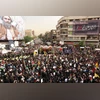)
Tehran: People gather as the coffins of Hamas late political leader Ismail Haniyeh and his bodyguard are carried on the back of a truck during a funeral procession in Tehran, Iran, 01 August 2024.(Photo: PTI)
Iran reiterated it wants to avoid all-out war with Israel, even as it threatened to retaliate for last week’s assassination of a leading Hamas figure in its capital.
Tehran, which had already vowed revenge for the killing of Ismail Haniyeh, said it aimed to deter Israel from repeating similar moves. Israel has neither confirmed nor denied being responsible for his death.
“Reinforcing stability and security in the region will be achieved by punishing the aggressor and creating deterrence against Israel and its adventurism,” a spokesperson for Iran’s foreign ministry told reporters on Monday in Tehran.
The comments come as Group of Seven and regional officials rush to avert a wider conflict.
G-7 members have reached out to Iran to try to ensure its retaliation isn’t serious enough to spark a regional war, according to people familiar with the matter.
Jordan’s foreign minister made a rare trip to Tehran over the weekend and Qatar, which has mediated between Iran and the US in the past, has also been in contact with the Islamic Republic, according to a person with knowledge of the matter.
Nasser Kanaani, the spokesperson for Iran’s foreign ministry, warned of “consequences” for any country supporting Israel, an apparent threat to the US and its allies as they rally to defend the Jewish state. General Michael Kurilla, head of Central Command, which oversees US forces in the Middle East, was in Israel on Monday for talks, an official briefed on the visit said.
Israel is in a “multi-front war against Iran’s axis of evil,” Prime Minister Benjamin Netanyahu said on Sunday. “We are striking every one of its arms with great force. We are prepared for any scenario — both offensively and defensively.”
G-7 foreign ministers spoke on Sunday about the risks of a regional war. US Secretary of State Antony Blinken said there was an “urgent need for de-escalation.”
Blinken told his G-7 counterparts that an attack on Israel by Iran and Hezbollah could begin as early as Monday, Axios reported.
Haniyeh was killed just hours after a deadly air strike in Beirut against Fuad Shukr, a senior Hezbollah commander. Israel said it was responsible for that hit and blamed Shukr for organizing a rocket attack on a Druze town in the Israeli-controlled Golan Heights that killed 12 children and teenagers playing football.
Tensions Ramp Up in the Middle East
Iran and Israel exchanged fire in April when Tehran accused its arch enemy of striking a consulate building in Syria. Iran launched 300 drones and missiles at Israel. Yet it effectively telegraphed the move in advance, helping Israel and its partners — including the US, France, UK and Jordan — intercept almost all the projectiles and ensuring they caused little damage.
Israel, under pressure from the US and Europe not to respond aggressively, launched a limited strike on an Iranian airbase.
Hamas and Hezbollah are both designated terrorist organizations by the US and are part of what’s often called Iran’s ‘Axis of Resistance,’ a group of anti-Israel and anti-US militias in the Middle East.
The war in Gaza erupted when Hamas fighters swarmed into southern Israel on Oct. 7, killing 1,200 people and taking 250 hostage. Israel’s subsequent offensive on Gaza has killed around 40,000 Palestinians, according to health officials in the Hamas-run territory.
First Published: Aug 05 2024 | 11:02 PM IST









